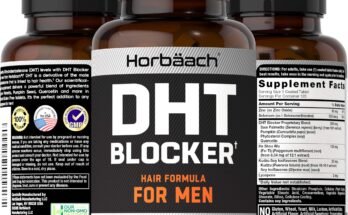Usually the male hair loss or androgenetic alopecia are the commonest of complaints. DHT or dihydrotestosterone is one of the major factors responsible for this type of hair loss. DHT attaches to receptors of the hair follicles, causing them to shrink, weaken, and not be able to produce hair. This is one of the determining factors in many people turning to DHT blocker, a possible course of treatment they feel may help stop hair loss.
Are they really effective? Well, to answer this question scientifically, let us examine research on such treatments.
What Are the DHT Blockers?
The synthesis or actions of DHT on hair follicles are inhibited by substances designed as DHT blockers. One may administer such blockers topically, orally, or through certain herbal supplements. In other words, to slow or prevent hair loss by reducing the concentration of DHT around the hair follicles.
Popular examples of DHT blockers include Finasteride and Dutasteride. They are often prescribed for various stages of androgenetic alopecia, or male pattern baldness, after adequate clinical testing has shown positive results for the reduction of hair loss while enhancing hair growth in numerous cases.
How Do DHT Blockers Work?
To discover how DHT blockers act, one must first have an understanding of DHT synthesis. The conversion of testosterone to DHT is posited to be done by an enzyme known as 5-alpha reductase. DHT blockers impair either this enzyme or DHT’s action by partially preventing it from binding to the receptors on hair follicles.
For example:
Finasteride works by inhibiting 5-alpha reductase, reducing DHT levels in the scalp by up to 60% or more.
Dutasteride inhibits both types of 5-alpha reductase enzymes (Type 1 and Type 2), making it even more effective at reducing DHT levels.
A study published in the Journal of the American Academy of Dermatology showed that Finasteride promoted hair growth in 65 percent of men who consistently took the medication over two years.
Topical Vs Oral DHT Blockers
There are, generally speaking, two forms of treatment with respect to DHT blockers: oral and topical.
- Oral DHT Blockers
Oral medications like Finasteride are, as a rule, more effective in lowering the level of DHT. While its side effects of lowered libido, 6 erectile dysfunction, or mood swings may deter some users. Such side effects are rare, however, they form part of the risks taken into consideration when selecting oral DHT blockers.
2. Topical DHT Blockers
Topical solutions that offer low absorption of DHT in the scalp help avoid systemic side effects visible with oral medications. The efficacy of topical treatments is also being studied, general go-ahead for them seeming, nevertheless, comparatively minimal than their oral counterparts.
Natural DHT Blockers
Those wary of becoming guinea pigs in various drug treatments believe that some natural DHT blockers help halt hair loss, including:
Saw palmetto: Taken as an extract of the fruit of the Serenoa repens tree, it is suggested by some studies to decrease DHT levels. A study published in ACM Journal in 2002 found that men using topical saw palmetto extract improved hair density.
Pumpkin seed oil: This oil from pumpkin seed possibly blocks DHT production and has shown in a 2014 . The study to improve hair growth by about 40% among men suffering from hair loss within 24 weeks.
Green tea: Some research proposes that EGCG, or Epigallocatechin gallate, in green tea inhibits DHT production.
Are DHT blockers effective?
Yes, DHT blockers work very well for a lot of people, especially in the case of male pattern baldness. A huge number of clinical studies, including those of Finasteride and Dutasteride, have demonstrated that these medicines can slow down hair loss and allow for regrowth in a lot of people.
Nevertheless, such responses may vary according to factors such as severity, personal history, and onset of administration. Starting DHT blockers sooner in treating hair loss improves the outcome.





One Comment on “Do Natural DHT Blocker Really Work for Hair Loss Prevention?”